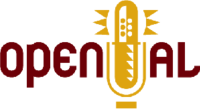What is OpenAL?

OpenAL is an open-source and free audio library developped by Creative Technology. The first version, however, was made by Loki Software. The API targets spacialized audio and sound managing so that it’s simple to simulate sound attenuation over distance and Doppler effect. OpenAL is supported on a wide variety of platforms, from PC (Windows, Linux, FreeBSD, Mac OSX and so on) to consoles (PS3, Xbox…).
The latest version was released in 2005 (9 years old ago!) and is OpenAL 1.1. It’s then pretty logical that we should have OpenAL 1.1 in Haskell.
OpenAL and Haskell
“Wait… we already have OpenAL in Haskell!”
That’s true. However, the OpenAL Haskell package has some serious issues.
The first one is that package is not a direct binding to OpenAL. It’s a high-level wrapper that wraps stuff with obscure types, like StateVar or ObjectName. Even though such abstractions are welcomed, we should have a raw binding so that people who don’t want those abstractions can still use OpenAL. Moreover, such high libraries tend to lift resources allocations / deallocations into the GC1. That is a pretty bad idea because we, sometimes, want to control how long objects live.
The second one, which is as terrible, is the fact that those abstractions aren’t defined by the Haskell OpenAL package, but by another, which is… OpenGL. The latter is not a raw binding to OpenGL – for that have a look at OpenGLRaw or gl – but the same kind of high-level oriented package. A lot of us have asked the authors of both the package to agree of making those abstractions shared between both the libraries; they never seemed to agree.
And even though, having a dependency between OpenAL and OpenGL is insane!
Sooooo… since Edward Kmett had the idea of gl to fix similar issues, I think I should have the idea of al to go along with gl. The idea is that if you want to use one, you can use the other one without any conflict.
al 0.1
Yesterday night, around 20:00, I decided to make it. It took me several hours to write the raw binding, but I finally made it and released al 0.1 the very next day – uh, today!
Because OpenAL is not shipped with your 2 nor anything special, and thus because you have to explicitely install it, installing al requires a bit more than just typing cabal install al.
Installing al
cabal update
First things first:
cabal updateYou should have al available if you type cabal info al afterwards.
c2hs
al requires you to have c2hs – version 0.23.* – installed. If not:
cabal install c2hsBe sure it’s correctly installed:
c2hs --version
C->Haskell Compiler, version 0.23.1 Snowbounder, 31 Oct 2014
build platform is "i386-mingw32" <1, True, True, 1>OpenAL SDK
Of course, you should have the OpenAL SDK installed as well. If not, install it. It should be in your package manager if you’re on Linux / FreeBSD, and you can find it here for Windows systems.
Important: write down the installation path, because we’ll need it!
Installing al
Here we are. In order to install, al needs the paths to your OpenAL SDK. I’m not sure whether it could vary a lot, though. The default Windows paths are:
C:\Program Files (x86)\OpenAL 1.1 SDK\libsfor the libraries ;C:\Program Files (x86)\OpenAL 1.1 SDK\includefor the header files.
In future releases, I’ll default to those so that you don’t have to explicitely pass the paths if you have a default installation. But for the moment, you have to pass those paths when installing:
cabal install al --extra-lib-dirs="C:\Program Files (x86)\OpenAL 1.1 SDK\libs"
--extra-include-dirs="C:\Program Files (x86)\OpenAL 1.1 SDK\include"Of course, you may adapt paths to your situation. You may even try without that for UNIX systems – it might already be in your PATH, or use slashs for MinGW.
Using al
al lays into two module trees:
Sound.ALSound.ALC
The former exports anything you might need to use the OpenAL API while the latter exports symbols about the OpenAL Context API. Please feel free to dig in each tree to import specific types or functions.
OpenAL documentation
al doesn’t have any documentation for a very simple reason: since it’s a raw binding to the C OpenAL API, you should read the C documentation. Translating to Haskell is straightforward.
What’s next?
Up to now, al doesn’t cover extensions. It’s not shipped with ALUT either as I want to keep the package low-level and raw – and don’t even try to make me change my mind about that ;) .
If you have any issues, please let me know on the issues tracker. I’m responsive and I’ll happily try to help you :) .
Once again, have fun, don’t eat too much chocolate nor sweets, and happy Easter Day!
salt likit
ReplyDeletesalt likit
dr mood likit
big boss likit
dl likit
dark likit
DKH
Thank you for writinng this
ReplyDelete